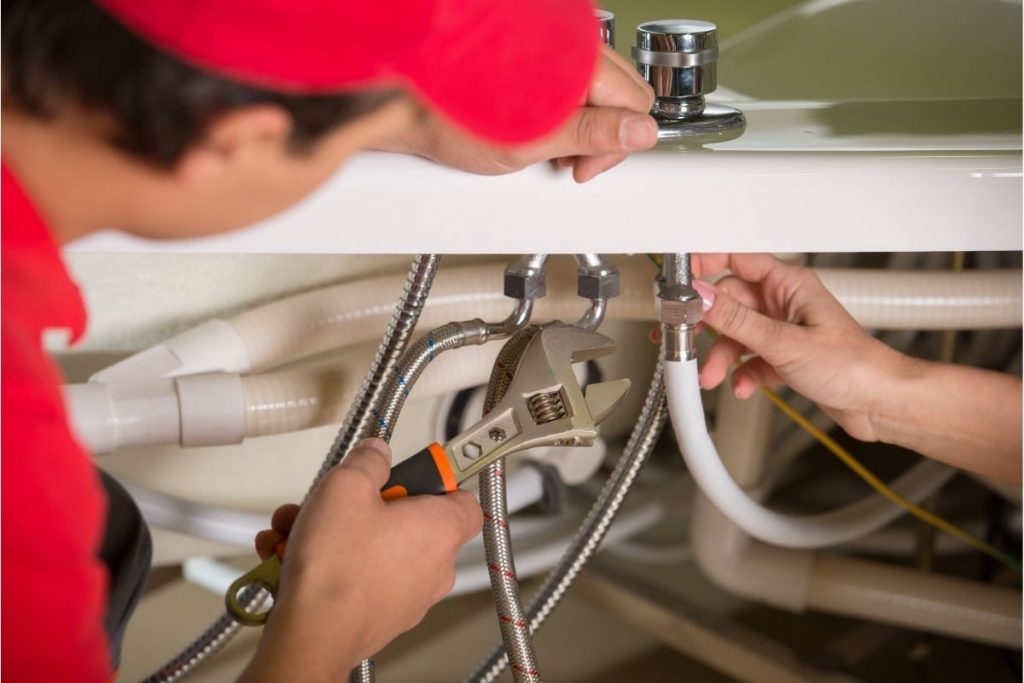When we’re finishing high school, there’s often a lot of talk about “what’s next?” for you and you might have decided that college isn’t for you. As a result, you might be considering a career path in plumbing.
That’s a great idea. Becoming a plumber is a great career choice and is almost recession proof – we’re always going to need plumbers and as a qualified plumber, you can earn on average, upwards of $50,000.
The one route to becoming a plumber is to enroll in a plumbing apprenticeship, but sometimes it can be very difficult to understand what the format of a plumbing apprenticeship is and how long it might take.
So, we’ve created an informational step by step guide to help you on your way to becoming a plumber, paired with some great to know information around the apprenticeship process.
Go to Page Section:
Is There Any Point In Becoming A Plumber?
Aside from the points we’ve stated above that plumbing is a necessary role and we will always need them and the salary is very good – there are other reasons you should consider getting on this career ladder.
On average, there are around 70,000 plumbing vacancies expected in the year 2028 in the US alone according to the Bureau Of Labor Statistics. So, what we’re seeing is a rise in demand for the plumbing trade.
Depending on how experienced and qualified you become, you can choose to become self-employed and work for yourself – or you can choose to work for a company. Some plumbers work additional hours for emergencies and earn much more money than the average plumber.
As a very skilled role, the need for more plumbers have never been higher and you can be a part of this.
What Exactly Is A Plumbing Apprenticeship?
Apprenticeships in general are typically offered for practical or vocational courses that allow you to train in professional roles, whilst earning and learning. You have the ability to get a college degree or equivalent, without the headache of student debts.
With plumbing apprenticeships, you’ll normally have a mentor outside of the classroom when you’re working and learning on site. You’ll be taught and instructed in how to do certain tasks, without any pressure to begin with.
Your working and learning environment is often governed by the union of plumbers or through a professional plumbing company. Not only will you learn the fundamentals of plumbing and the essential skills to apply to the trade – but you’ll go further.
Your learning might move onto the branding and marketing side of plumbing, particularly for those more interested in becoming self employed in the future.
Before the completion of the plumbing apprenticeship, you will have completed a specific amount of hours of practical experience.
You will have learned an extensive amount of fundamental skills, safety information and regulations and be asked to prove your learning and development through examination.
To start on your journey as an entry level plumber, you must pass this licensing exam.
They are crucial for any prospective plumber because not only does it confirm to yourself that you understand the basics and what you’ve been taught (decreasing chances of error), but it confirms to the union, company and mentor that you’re competent enough for the role.
This is important because plumbing will take place in people’s homes and safety is paramount. Remember, plumbing can also involve dealing with gas and this can be life threatening if not dealt with correctly.
After this, many plumbers will undertake an additional one year masters course to hone in on their skills and cement themselves in the field.
This has advantages for both your own credentials (great for marketing and knowledge), but some states have a requirement of this level of qualification before you’re allowed to apply your trade.
So, How Long Is This Going To Take?

Plumbing apprenticeships, as with all apprenticeships, will vary in their duration depending on a number of factors.
These can include whether you’re taking full time or part time, who the provider of the apprenticeship is, the location, whether you pass or fail a year and if you take on additional learning.
Typically though, apprenticeships in plumbing will take between two and five years, but you will have to take the above points into account. Remember though, that unlike college – you’ll be earning and learning during these years, so in a way the longer you’re in it, the better.
How Do I Get Involved With A Plumbing Apprenticeship?
Well, the first and most crucial thing to do while you’re at high school is to get your high school diploma and graduate. However, if you’re looking for a new career and you didn’t achieve this – you can complete a GED and then formally apply.
There’s a few ways to apply for plumbing apprenticeships. The quickest is to look at your plumber’s union, but you can speak with careers advisors or utilize social media, LinkedIn and other job boards which often advertise apprenticeship vacancies.
How Should I Prepare?
Preparation for a plumbing apprenticeship is as extensive as any job interview. You should ensure that you’re on track for your basic qualifications like your high school diploma – this will be mandatory.
You should then try and develop your skills and experience in any free time you have. Ensure that you’ve got your resume as professional and updated as possible, and be prepared to work hard and learn from professionals.
With any professional course, mistakes will happen in the early stages – the important thing to remember is that mistakes will always happen and you shouldn’t worry, you should simply use them and learn from them. Nobody is perfect!
Conclusion
Plumbing apprenticeships can take 2-5 years but may be longer depending on circumstances. However, don’t let the duration be a factor in your career path and development. The time is certainly worth it and you’ll earn money whilst developing skills in a recession-proof field.










